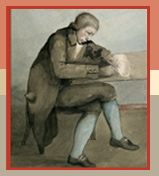
Iolo's Life
Autobiographical material (NLW 21387E)
The Agricultural Observer and Farmer
The Poet and Hymnist
Iolo's career as a poet has been neglected until comparatively recently. During the nineteenth century his contribution as a hymnist was acknowledged as a result of the attention he received as an antiquary and Unitarian. In the twentieth century he has received more attention as a forger and a mythmaker rather than as a poet in his own right.Iolo composed poetry in both Welsh and English, but he excelled in the former, mastering the strict-metre and free-metre forms. His talents as a poet in Welsh were nurtured by the poets of his locality. Edward Williams, Middle Hill lent him a copy of Siôn Dafydd Rhys's bardic grammar, but the encouragement which Iolo received from the Grammarians was the most important factor of all, especially the support of Lewis Hopkin, John Bradford and Edward Evan(s). The bardic education which he received from the Grammarians was reinforced when Iolo set about transcribing the work of the Poets of the Princes and Dafydd ap Gwilym from the manuscripts of these Glamorgan men and members of the Gwyneddigion Society.
His early strict-metre poems are mainly love poems which emulate the vocabulary, mood and themes of the poetry of Dafydd ap Gwilym. Many were composed for his sweetheart 'Euron', Margaret (Peggy) Robert(s), the woman he would marry in 1781: 'Cywydd y Serch', 'Cywydd yr Anhun', 'Cywydd i anfon y fwyalch at Euron', and the 'Cywydd i Ddyfalu Serch'. Despite the imitative nature of these early poems, they show clearly that Iolo had mastered Cerdd Dafod (poetic art). His inventiveness in the strict-metres is demonstrated in the new metres which he devised, Dosbarth Morgannwg (the Glamorgan Classification), which were published in Cyfrinach Beirdd Ynys Prydain (1829).
Iolo's free-metre poems are also mainly love and nature poems, which reflect his Romantic tendencies. Among them are poems which praise the common man and his moral virtues, and which elevate the rural life over urban life. Several of his poems express a loathing of London and juxtapose the city's wickedness with the innate goodness and cleanliness of rural Glamorgan. The free-metre poems often rework the traditional triban form which circulated widely in Glamorgan. It should not be forgotten either that he composed occasional verse in both Welsh and English: for former friends such as Owen Jones (Owain Myfyr) (see 'I Owain Myfyr' (To Owain Myfyr) below), for neighbours such as Gwenllian Lloyd (NLW 21388E, no. 7) and to advertise his own grocer's shop.
A range of voices from real and imagined characters can be heard in Iolo's free-metre poems (including those attributed to other poets): Rhys Goch ap Rhicert, Wil Tabwr, Wil Hopcyn and Dafydd Nicolas. These poems were intended to show that Glamorgan possessed a lively tradition of both light and druidic 'domestic' (teuluaidd) poetry.
Iolo's talents as an English-medium poet were also nurtured by the Grammarians, who were well-versed in contemporary English literature as well as the Welsh bardic tradition. His friends Daniel Walters and John Walters, jun., also played an important role in helping him to find his voice as an English poet and it was probably they who introduced him to the work of Alexander Pope and George Dyer.
Iolo's English poems were published in Poems, Lyric and Pastoral (1794). The volume contains a combination of lyrical pastoral poems and bardic poems which reveal the debt his bardic vision owed to the political climate of the 1790s. The main themes of these poems are liberty, equality and brotherhood, as well as important personal standards such as honesty and moral rectitude.
Iolo was also a prolific hymnist. His manuscripts contain around three thousand Unitarian hymns, which, like his English poems, discuss themes such as brotherhood and liberty. A selection of his hymns were published in the volume Salmau yr Eglwys yn yr Anialwch (1812).
'I Owain Myfyr'
Cenfigen sydd yn ddistaw lidiawg
A hyn am achos bychan iawn
Pob gair o'i genau'n dra chelwyddawg
A gwenwyn sarphes ynddi'n llawn,
Bront yw'r ellellyes falch annifyr
A llawer bryntyn iddi'n wâs
Pwy fell'n fwy nag Owain Myfyr
Ai ddichell mawr a'i gelwydd cas
Nid tebyg iddaw dan y Nefoedd,
Neb am ddichellion iddo'n ail,
Neb iddaw'n frawd a chwilio bydoedd
Myrdd fwy'n ei rhif eu rhif y dail,
Ar bennill englyn cân a chywydd,
Eithafoedd anglod fydd ei ran
Bydd sôn am dano yn dragywydd
A'i enw yn drewi ym mhob man.
Cenfigen sydd yn ddistaw lidiawg
A hyn am achos bychan iawn
Pob gair o'i genau'n dra chelwyddawg
A gwenwyn sarphes ynddi'n llawn,
Bront yw'r ellellyes falch annifyr
A llawer bryntyn iddi'n wâs
Pwy fell'n fwy nag Owain Myfyr
Ai ddichell mawr a'i gelwydd cas
Nid tebyg iddaw dan y Nefoedd,
Neb am ddichellion iddo'n ail,
Neb iddaw'n frawd a chwilio bydoedd
Myrdd fwy'n ei rhif eu rhif y dail,
Ar bennill englyn cân a chywydd,
Eithafoedd anglod fydd ei ran
Bydd sôn am dano yn dragywydd
A'i enw yn drewi ym mhob man.
(NLW 13148A, p. 175)

